Racism

I invite my Christian brothers and sisters of all racial backgrounds to join me in my prophetic grieving. Our cries cannot and should not be the same. For some of us, who inhabit black skin, our tears will be coated in rage and exhaustion. They will be punctuated by the stark feeling that we are permanently displaced in the only place we have known as home. We know that we fighting for our lives and have no choice but to cry out to God.
For others, particularly white Christians, the choice may not be as clear. Lament for Charleston cannot be separated from a challenge to the system of white supremacy that serves to protect white people and white interests. Prophetic grief requires a confession that the system of white supremacy infiltrates and shapes our worship spaces, theologies, and ethics. I have no doubt that this process will be risky for my white colleagues. Rarely does transformation occur without birthing pains. The reality of power is that while my survival is at stake, my white Christian brothers and sisters have the option to opt-out, avoid the pain, and remain silent.
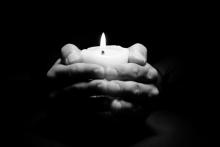
We are brokenhearted by the murders of nine parishioners at the Emanuel African Methodist Episcopal Church in Charleston, S.C. We join our brothers and sisters in deep lament for the lives lost in this evil act, and our prayers go out to all of the victims, their families and their communities.
Atrocities like this wound the very soul of our nation. We must not merely attribute this horror to the depraved actions of one individual, mourn those we have lost, and move on as if there is nothing more to do. In his statement yesterday, President Obama quoted Dr. Martin Luther King, Jr.'s words in the wake of the bombing of a black church in Birmingham, Alabama in which four little girls were killed:
"...We must be concerned not merely with who murdered [these girls], but about the system, the way of life, the philosophy which produced the murderers. Their death says to us that we must work passionately and unrelentingly for the realization of the American Dream."
The deep wounds of racism, America's original sin, still linger in our society, our institutions, and in our minds and hearts — sometimes explicitly, but far more pervasively through unconscious bias. Wednesday's terrorist act is the latest manifestation of this lingering sin. Are there no safe places for black people in our country, even the places where they come together to worship?
We all have the responsibility to overcome both the attitudes and the structures of racism in America. Today we mourn, but tomorrow we must act.
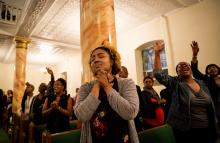
Lament is not a passive act. Many Christians may hear the word lament and assume that feeling bad about suffering is the purpose of lament. How sad that people died. How sad that the shooter had a mental illness. But lament moves beyond bad feelings for the privileged. Lament is subversive and an act of protest. The powerful and the privileged have no problem being heard. It is the marginalized that need to be heard. The voiceless speak through lament. They cry out that things aren’t right. They are not the way things are supposed to be. Lament voices the prayers of the suffering and therefore serves as an act of protest against the powers.
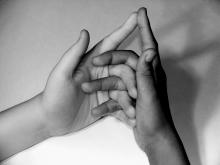
I am grieving and lamenting and beyond angry over what feels like open season on the black community/church right now in the U.S. White Christians, this is the time to pay attention and be part of our nation’s struggle to understand and address the continual violence happening against our black sisters and brothers. When one part of the Body hurts we all hurt. When one part of the Body is repeatedly targeted, killed, not protected, pulled out of swimming pools, seen as threats when unarmed – and then misrepresented, silenced, or made small through ahistoric excuses, side-stepping through political mess, or any other form of evil – we need to stand up. We need to show up – loudly. We need to demand a different response – and start with our people in the church.

Last night nine Christians were massacred while at Bible study at Emanuel AME Church in Charleston, S.C. The dead include state Sen. Rev. Clementa Pinckney, senior pastor and state senator, and his sister.
The suspect, Dylann Roof, is 21 years old. He sat for an hour with the pastor and others gathered for Wednesday night Bible study, then open fired. Reportedly, he reloaded as many as five times while church members tried to talk him down. He said he "had to do it." This was a racialized hate crime.
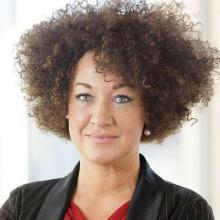
I don’t know what Rachel has been through in her life, but Jamelle Bouie makes an important distinction in understanding Rachel’s situation over at Slate. He writes that, “To belong to the black community is to inherit a rich culture; to be racially black is to face discrimination and violence.” Here’s a bit of information about the modern black experience of racism, discrimination, and violence in the U.S. FYI – being black in America is more dangerous than gaining custody of an adopted brother and drawing with crayons.

The president of the U.S. Conference of Catholic Bishops kicked off a gathering in St. Louis of approximately 250 of the nation’s bishops by referring to Ferguson.
“We mourn those tragic events in which African-Americans and others have lost their lives in altercations with law enforcement,” said a statement prepared by Archbishop Joseph E. Kurtz of Louisville, Ky., which was read by Bishop Ronny Jenkins, general secretary of the U.S. Conference of Catholic Bishops on June 10.
“Racism is an evil which endures in our society and in our church.”

It was a devastating weekend for black people in America.
On Friday, a white police officer pulled his gun at a pool party and assaulted a 15-year old black girl who cried for her mom in McKinney, Texas. On Saturday, a young black man committed suicide in his parents’ home in the Bronx after being held without trial at Rikers Island for three years (nearly two in solitary confinement), accused of stealing a backpack — a charge that prosecutors ultimately dropped. On Sunday evening, hotel security officers profiled four young black organizers from Baltimore in the lobby of the Congress Plaza Hotel at the conclusion of The Justice Conference.
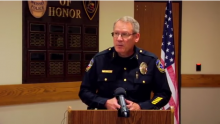
McKinney, Texas police officer Eric Casebolt — whose recorded response to a disturbance call at a community pool party on Friday went viral, sparking national outrage about the force used against black teens — resigned from the police force on Tuesday. Police Chief Greg Conley said Tuesday evening that Casebolt was “out of control” and his actions were “indefensible.”
“He came into the call out of control and as the video shows was out of control during the incident,” Conley said, adding, “I had 12 officers on scene and 11 of them performed according to their training. They did an excellent job.”
From local ABC News affiliate WFAA in Dallas:
The 10-year veteran of the McKinney Police Department was placed on administrative leave Sunday after a 7-minute video of the incident at a Craig Ranch community pool gained traction on the Internet. That clip has now been viewed almost 9.5 million times.
The footage shows Cpl. Casebolt, who is white, aggressively responding to the disturbance call, using profane language with black teenagers, unholstering his service weapon and pointing it toward the unarmed teens, and restraining a 15-year-old girl in a swimsuit by forcing her to the ground and placing his knee on her back.
View the original video of the incident below.

MY GREAT-GRANDMOTHER, Elizabeth “Lizzie” Johnson, was born in 1890 in Camden, S.C., with a different last name from all the other people in her household. Three generations later, we have no idea where the name Johnson came from.
Lizzie grew up working plantation land owned by her grandmother, Lea Ballard. Lea received the land in the wake of the Civil War: We don’t know how or why, though one theory speculates that Lea, who was listed as a 42-year-old mulatto widow on the 1880 U.S. Census, may have been the daughter of her slave owner. He may have given the land to her after the Civil War. We don’t know. We only know that Lea owned it, that she had 17 children who worked that land, according to family lore, and that the city of Camden eventually stole the land from her by the power of eminent domain. This we know from records I hold in my possession.
Lizzie married a railroad man named Charles Jenkins. Lizzie and Charles had three children; Charles later died in a railroad accident. Lizzie had a choice: endure the brutality of the Jim Crow South alone with three kids, or move with the stream of black bodies migrating north. Lizzie migrated to Washington, D.C., and, eventually, to Philadelphia and took her lightest-skinned child with her.
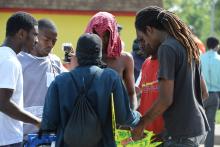
Socioeconomic reconciliation is the removal of gaps in opportunity, achievement, health, thriving, and well-being that exist between groups of people in our nation and world. In the face of myriad breaches of the common human bond and experience, a breakthrough act of the Spirit today would activate and agitate the established church in her ministry: a ministry of socioeconomic reconciliation.
The ministry of socioeconomic reconciliation will require a church empowered with tongues of fire and the gift of interpretation. These tongues must speak with a prophetic voice. But we must also have the heart and capacity to translate the words of marginalized communities into the language of policy, power, and program. That is why I thank God for the compelling, confusing roles I’ve been called into over the last nine months. This form of reconciliation requires the church to fulfill of the vocation of the militant mediator, which offers as much renewal in the streets and city hall as we experience in the sanctuary.

Men and boys of color are 21 times more likely to be fatally shot by the police than their white counterparts. Of the 1,217 deadly police shootings that occurred from 2010-2012, men of color between the ages of 15 to 19 were killed at a rate of 31.17 per million, while the rate for white males the same age was only 1.47 per million.
This pattern is not new. It is old and repetitive. And it is sickening.

EARLIER THIS year came a flurry of new horror stories about the abuses of human dignity that are, apparently, common in many of America’s college fraternities. First came the video from the University of Oklahoma in which a busload of “true gentlemen” of Sigma Alpha Epsilon are seen and heard spewing racist bile. Shortly thereafter the revelation that the Kappa Delta Rho chapter at Penn State had maintained a private Facebook page featuring nude photos of unconscious young women became national news.
The old saying “Once a frat boy, never a man” may be just another sweeping stereotype. But the evidence is mounting that many of the nation’s fraternity houses are the breeding ground for an exclusive culture of entitlement and impunity that their mostly white, upper-class members carry into their future roles in the elite circles of business and government.
It should be noted that when we talk about “fraternities,” we are really just talking about the historically all-white social organizations with Greek-letter names. Historically black fraternities have their own problems, especially with hazing, but they have experienced nothing like the epic bad behavior found among their paler brethren.
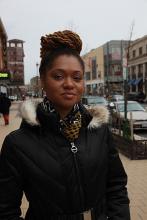
Bio: Erika Totten is a leader in the Black Lives Matter movement in Washington, D.C., and the black liberation movement at large. She is a former high school English literature teacher, a wife, a stay-at-home mom, and an advocate for the radical healing and self-care of black people through “emotional emancipation circles.”
1. How did you get started with “emotional emancipation” work?
Emotional emancipation circles were created in partnership with The Association of Black Psychologists and the Community Healing Network. I was blessed to be one of the first people trained in D.C. I had been doing this work before I knew what it was called. My organization is called “Unchained.” It is liberation work—psychologically, mentally, spiritually, and emotionally.
I want to tell people to be intentional about self-care. Recently, we had a black trans teen, who was an activist, commit suicide. A lot of times you need to see a counselor or therapist, which is often shunned in the black community. Because of racism, we are taught that we need to be “strong.” But it’s costing us our lives. As much as we are dismantling systems, we have to dismantle anything within ourselves that is keeping us from experiencing liberation right now.

Everything must change.
Injustices around the world and here at home are coming to light despite a long, willful blindness. Half a world away, the long-muted voices of the victims of American military policy were allowed to break through the wall of propaganda and infotainment used to keep them hushed. A recent New York Times report reveals one of the worst-kept (actually un-kept, but vastly underreported) secrets of our government: that we often do not know who we are killing with drones.
And at home, in Baltimore, the death of Freddie Gray in police custody has caused long-simmering tensions – born of institutionalized segregation, nearly inescapable poverty, and a scourge of police brutality – to erupt in an uprising of passionate resistance, with destruction punctuating otherwise peaceful marches. Media coverage has given far more attention to the “riots” than to the systemic violence that has kept so many African Americans, not only in Baltimore but throughout the country, living in poverty and insecurity.
1. Officers Charged in Freddie Gray's Death, Ruled a Homicide
“In an unexpected announcement Friday, Baltimore lead prosecutor Marilyn J. Mosby said there is “probable cause” to file criminal charges against police officers in the death of Freddie Gray ...”
2. How Biased Is Your Feed?
Via Future Journalism Project Media Lab: A new study indicates that news and information gets more biased as it passes through social networks. … And given that half of Facebook and Twitter users consume news via those networks, our consumption and digestion of such “news” could take on that bias.
3. Nepal Earthquake: Up to 15,000 May Have Died, According to Army Chief
Amid public anger at government response to the massive earthquake and threats of disease, the country’s army chief painted a grim estimate of between 10-15,000 likely deaths in the wake of the weekend’s quake.
4. Lawmaker Considers Blocking Baltimore Protesters’ Food Stamp Benefits
“‘That’s an idea, and that could be legislation,’ [Maryland state legislator Patrick McDonough] said in response to a caller who asked if benefits could be revoked from parents of protesters. ‘I think that you could make the case that there is a failure to do proper parenting, and allowing this stuff to happen—is there an opportunity for a month to take away your food stamps?’”

I love Martin Luther King. I wrote my master’s thesis on his approach to nonviolence. King is the greatest prophet in the history of the United States. And white people should know him better.
Blitzer, like so many white people, doesn’t know Martin Luther King. He misses King’s point. If white people want to reference King, we need to stop using him to condemn black violence. We need to stop pitting a black man against black people. It’s patronizing. It’s demeaning. And it misses the point.


